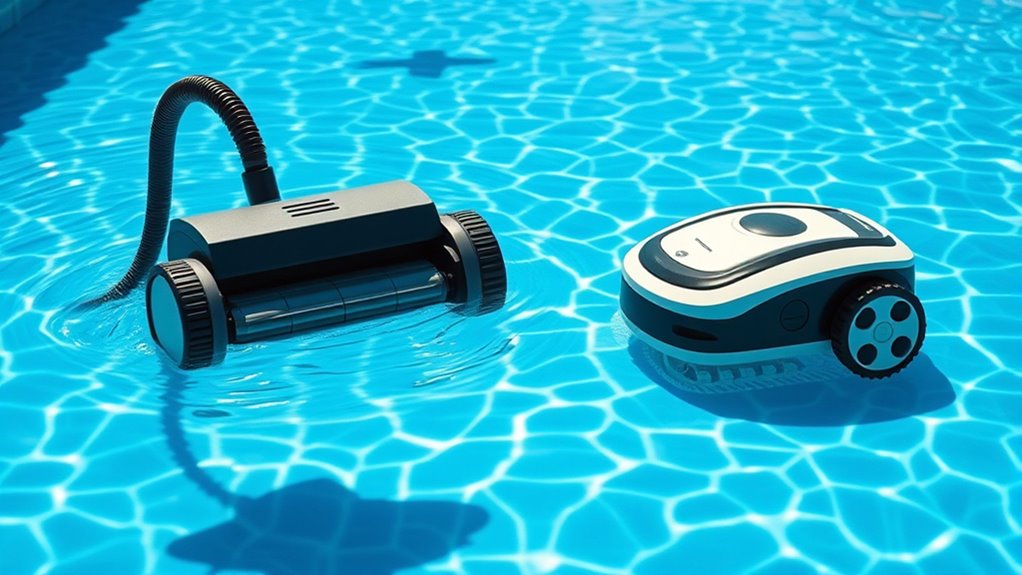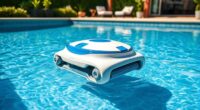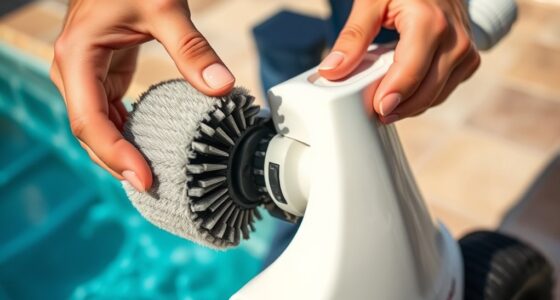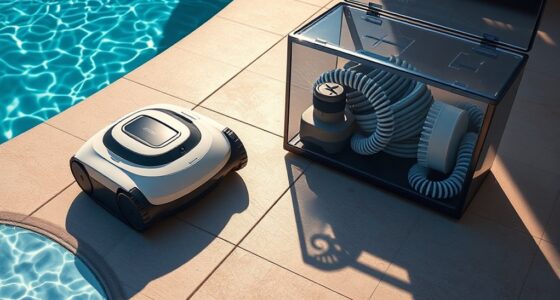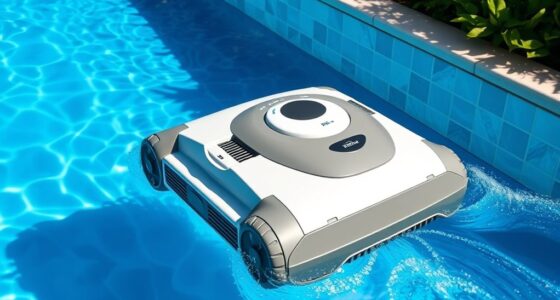Suction pool cleaners rely on your pool’s pump and work well on floors, offering a simple, budget-friendly option with low maintenance. Robotic cleaners are independent devices with their own motors, providing thorough cleaning, including walls and complex shapes, though they consume more energy and cost more upfront. If you want an easier, more advanced cleaning solution or better coverage, robotic cleaners may suit you better. Keep exploring to find the best fit for your pool and needs.
Key Takeaways
- Suction cleaners rely on pool pump power, while robotic cleaners have internal motors and operate independently.
- Robotic cleaners are more effective at cleaning all pool surfaces, including walls and steps.
- Suction cleaners are simpler, more budget-friendly, and easier to maintain with fewer parts.
- Robotic cleaners often feature advanced navigation, remote control, and energy-efficient designs.
- Suction cleaners depend on pool system compatibility, whereas robotic models adapt to various pool shapes and sizes.

When it comes to keeping your pool clean, choosing the right cleaner can make a big difference. Two popular options are suction pool cleaners and robotic pool cleaners, each offering unique benefits. Your decision should consider factors like energy efficiency and maintenance costs, which directly impact your budget and convenience. Suction cleaners connect to your pool’s skimmer or dedicated suction line and rely on your pool’s pump to power their cleaning. They tend to be more energy-efficient because they don’t have their own motors, which means they use less electricity overall. This can lead to lower energy bills, especially if you run them frequently. However, their dependence on your pool’s existing pump might mean they add some strain, potentially increasing your maintenance costs over time if your pool’s filtration system needs repairs or upgrades. Additionally, because suction cleaners are relatively simple devices, they generally have fewer parts to break and are easier and cheaper to maintain. Filtration systems including HEPA filters capture allergens and fine dust, ensuring a cleaner pool environment. Properly maintaining your filtration system can extend the lifespan of your suction cleaner and improve overall pool water quality. Regular cleaning and inspection of your pool’s existing pump system can help ensure optimal performance of suction cleaners and reduce potential issues. Furthermore, compatibility with various pool shapes and sizes can influence the effectiveness of suction cleaners for specific setups.
Robotic pool cleaners, on the other hand, operate independently with their own motors and filters. They’re designed to be highly efficient in cleaning all pool surfaces, from floors to walls, often equipped with advanced navigation systems that cover the entire pool area thoroughly. Since they have their own power source and operate independently, they don’t put extra load on your pool’s filtration system, which can actually reduce your overall maintenance costs. They tend to be more energy-efficient than older models, especially newer ones built with energy-saving features, but they do consume more electricity than suction cleaners because of their internal motors. Still, many models are designed to be energy-efficient, and their precise cleaning means you spend less time running the cleaner, which can save on energy over the long run. When it comes to maintenance, robotic cleaners require periodic cleaning of their filters and some mechanical parts, but their durability and ease of service often make them a cost-effective choice in the long term. Regular maintenance of the robotic cleaner’s internal components can help prevent breakdowns and ensure optimal performance. Choosing a robotic cleaner can be especially advantageous for pools with complex geometries where thorough coverage is essential. It’s also worth considering that many robotic models now include features that allow remote monitoring and control via smartphone apps, enhancing user convenience and ensuring your pool stays clean with minimal effort.
Frequently Asked Questions
Which Cleaner Type Is More Eco-Friendly?
You might wonder which cleaner has a lower eco impact. Generally, robotic pool cleaners tend to use less energy, making them more eco-friendly due to their efficient energy use. They operate on rechargeable batteries and often have smart features that optimize cleaning time. Suction pool cleaners, on the other hand, typically rely on your pool’s pump, increasing energy consumption. So, if eco impact matters, robotic cleaners are usually the greener choice.
How Often Should Each Cleaner Be Maintained?
You should maintain your pool cleaner regularly to guarantee ideal performance. For suction cleaners, check and clean the filter regularly, especially after heavy use, and replace the filter as needed. Robotic cleaners require filter cleaning as well, but also benefit from battery life checks and charging after each use. Typically, clean filters weekly and inspect battery health monthly. Proper maintenance keeps both types working efficiently and extends their lifespan.
Can They Handle Large Debris or Only Small Particles?
Did you know that robotic pool cleaners can filter particles as small as 2 microns effectively? When it comes to handling debris capacity and particle filtration, suction pool cleaners typically excel at large debris, thanks to their powerful suction. However, robotic cleaners often have specialized filters for small particles, making them more versatile for fine debris. So, for large debris, suction cleaners are better; for small particles, robotic cleaners are more efficient.
Are There Specific Pool Shapes Better Suited for Each?
You’ll want to consider pool shape compatibility to optimize cleaning efficiency. For irregular or complex shapes, robotic pool cleaners often navigate better, reaching corners and tight spots more effectively. Conversely, suction pool cleaners work well with simple, rectangular pools where they can move in straight lines. Think about your pool’s shape and size to choose the cleaner that will give you the best cleaning efficiency and keep your pool sparkling.
What Are the Long-Term Cost Differences?
Imagine your pool as a treasure chest; how you maintain it impacts your long-term riches. Robotic cleaners often cost more upfront but save you money through better cost efficiency and lower maintenance expenses over time. Suction cleaners might be cheaper initially but can rack up higher maintenance costs and less efficiency. Ultimately, investing wisely in a cleaner aligns with your budget, ensuring your pool stays pristine without draining your resources.
Conclusion
Imagine your pool sparkling like a crystal-clear lake, every corner perfectly clean. Whether you choose the simple suction pool cleaner or the high-tech robotic cleaner, picture yourself lounging poolside, knowing your water is spotless without lifting a finger. Both options have their perks, but ultimately, it’s about enjoying the serenity of a pristine pool. So, pick the one that fits your style, and let your backyard oasis shine effortlessly.
